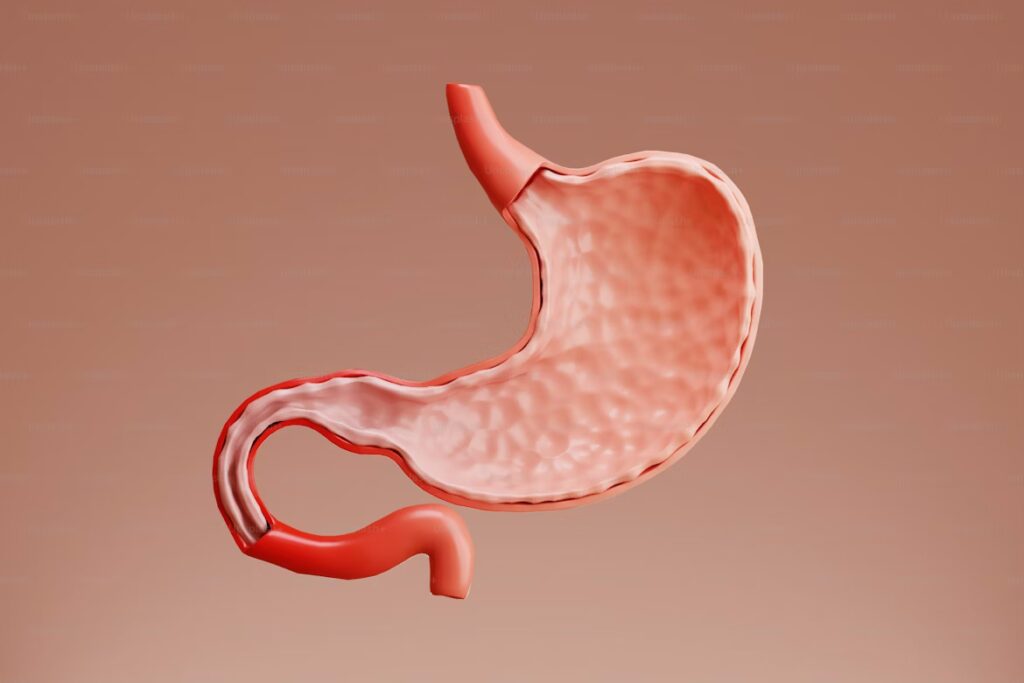TL;DR: Could Low Stomach Acid Be Behind Your Bloating and Gut Issues?
If you feel bloated, gassy, or constipated after meals—but your doctor says everything looks “normal”—low stomach acid could be the missing piece.
Stomach acid (HCl) is essential for breaking down food, absorbing nutrients like B12 and iron, and keeping your gut bacteria balanced. Chronic stress, poor chewing, antacids, H. pylori, and thyroid issues can all reduce acid levels—leading to uncomfortable reflux, bloating, constipation or incomplete BMs.
This post covers:
✅ Signs and symptoms of low stomach acid
✅ Functional lab markers I see in my gut health clients
✅ Root causes behind low stomach acid
✅ Practical ways to support acid naturally
🎥 Plus: Get access to my free ‘Gut Fix’ Training to stop guessing and start taking a root cause approach to gut healing.
You’re bloated, constipated, and uncomfortable after meals…
But your labs come back “normal.”
Your doctor shrugs it off. Maybe they hand you an antacid.
But nothing changes—and you still feel like crap.
If that’s you, here’s the truth: Most doctors aren’t trained to look for low stomach acid.
But as a functional dietitian and gut health expert, it’s one of the first things I assess with my clients.
🔍 What Is Low Stomach Acid?
Low stomach acid (aka hypochlorhydria) means your body isn’t producing enough stomach acid (HCl) to break down food properly.
And while conventional wisdom says acid is bad and reflux means you have too much…
👉 The real issue is often not enough acid to digest your food
🧬 What Happens When Stomach Acid Is Too Low?
You need stomach acid to:
✔️ Break down protein
✔️ Absorb key minerals like B12, iron and zinc
✔️ Trigger digestive enzymes and bile release
✔️ Prevent bacterial overgrowth, gut infections and food sensitivities.
Without enough of it, the entire digestive system is disrupted —and symptoms start stacking up.
🚨 Common Signs of Low Stomach Acid
These are the exact red flags I hear from clients before we run testing:
-
- Full after just a few bites
-
- Burping, gassiness, or bloating after meals
-
- Reflux (especially if it PPIs or acid reducers don’t help)
-
- Constipation or incomplete BMs
-
- Coated tongue or bad breath
Why Does Stomach Acid Get Low in the First Place?
There are several common (and often overlooked) root causes:
-
- Chronic stress: shuts down digestion and depletes mineral reserves needed for stomach acid production
-
- Not chewing thoroughly: chewing actually signals the gut to release stomach acid
-
- Medications: antacids and PPIs
-
- H. pylori infection: a common bacteria that reduces HCl production
-
- Hypothyroidism: thyroid hormones stimulates the parietal cells that produce HCl; when thyroid function is low, so is stomach acid
-
- Dysautonomia: impairs the vagus nerve’s role in digestion
Understanding the “why” behind low HCl is key to building a strategy that actually works.
📊What I See on Labs (That Most Docs Miss)
When I run advanced functional tests with my clients, signs of low stomach acid show up, even when traditional bloodwork misses it.
1️⃣ HTMA: Hair Tissue Mineral Analysis
We often see:
-
- 🔻 Low sodium, potassium, and zinc (all needed for acid production)
-
- 🔻Imbalances in phosphorus, cobalt, boron tied to poor digestion and low stomach acid
-
- 💥 Stress patterns that burn through minerals
-
- 🚨 Low calcium/magnesium ratio tied to adrenal dysfunction
👉 All signs that your body is struggling to make acid in the first place.
2️⃣ GI-MAP Stool Test
Signs of low stomach acid: :
-
- H. pylori overgrowth, which suppresses stomach acid production
-
- Fat malabsorption, and slow enzyme activity
-
- Bacterial imbalances, presence of candida or yeast
-
- Symptoms of reflux, nausea, bloating, incomplete BMs and chronic nutrient deficiencies
💡 What You Can Do About It
Here are a few strategies I help my clients implement to support stomach acid and digestion:
✅ 1. Replenish Minerals
Start with sea salt, potassium rich foods, and HTMA-guided supplementation.
Zinc, sodium, and potassium are non-negotiable for stomach acid.
✅ 2. Activate the Cephalic Phase & Chew Well
Digestion starts before your first bite.
Smell, savor, and chew each bite 20–30 times to signal acid production.
✅ 3. Incorporate Bitter Foods, Digestive Bitters or Apple Cider Vinegar
Before meals, try:
-
- 1 tsp apple cider vinegar diluted 2 oz water (start small and work up to 2 tbsp if well tolerated)
-
- Bitter greens or herbal digestive bitters to trigger digestion
✅ 4. Lower Stress + Stimulate the Vagus Nerve
Stress is a stomach acid killer.
-
- Try deep breathing, yoga, meditation, humming, tapping.
-
- Slow down at meals and take five deep belly breaths before meals—your nervous system needs safety to digest
Frequently Asked Questions About Low Stomach Acid
1. What exactly is low stomach acid, and why does it matter?
Low stomach acid (hypochlorhydria) means your stomach isn’t producing enough hydrochloric acid (HCl) to properly digest food. HCl is essential for breaking down protein, absorbing nutrients like iron and B12, triggering enzymes and bile, and keeping harmful bacteria in check.
2. What are the most common symptoms of low stomach acid?
Common symptoms include:
-
- Feeling full quickly
-
- Bloating or gas after meals
-
- Reflux (especially if antacids don’t help)
-
- Constipation or incomplete BMs
-
- Bad breath or coated tongue
-
- Relying on enzymes or food rules to feel okay
3. Why would my stomach acid be low in the first place?
Several factors can suppress acid production, including:
-
- Chronic stress
-
- Poor chewing habits
-
- Antacid or PPI use
-
- H. pylori infection
-
- Hypothyroidism
-
- Nervous system dysfunction (dysautonomia)
4. How do I test for low stomach acid?
While standard labs often miss it, functional tests like the HTMA (Hair Tissue Mineral Analysis) and GI-MAP stool test can reveal patterns of mineral depletion, H. pylori overgrowth, and signs of poor digestion—all pointing to low stomach acid.
5. What can I do to naturally increase stomach acid?
Start with these simple steps:
-
- Add mineral-rich foods and sea salt
-
- Chew thoroughly and activate digestion before eating
-
- Use bitters or diluted apple cider vinegar before meals
-
- Lower stress and support your vagus nerve
-
- Address underlying root causes through testing and personalized support
🎯 Ready to Stop Guessing?
If you’ve been bouncing between diets, supplements, or doctors who say “everything looks fine”…
And you know something is still off…
🎥 Watch my free training: “5 Steps to Finally Heal Your Gut—Without Cutting Out Everything You Love.”
You’ll learn exactly how I help clients go from backed up and bloated to, regular, and energized—without relying on supplements forever or giving up all your favorite foods.
👉 Click here to watch the training now.
You deserve digestion that feels calm, consistent, and effortless again.
And I’m here to help you get there (link to work together page on website) —starting with what your body actually needs: root cause: support, not restriction.




